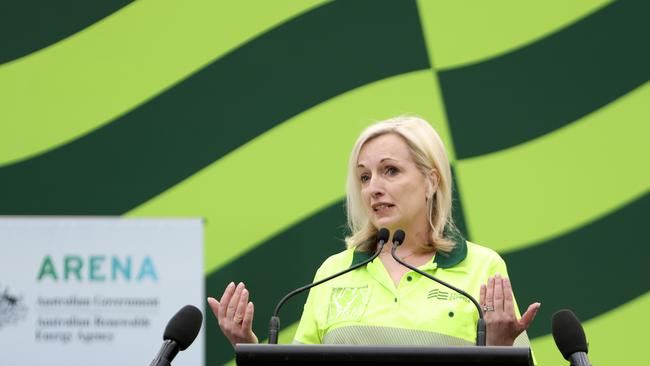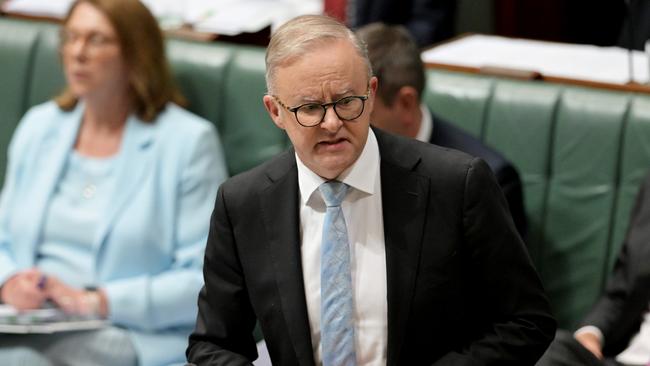
If Amazon founder and executive chairman Jeff Bezos has a Christmas present list, then Anthony Albanese will be a prime candidate to be added for 2024.
Of course, I am jesting, but the prime minister delivered the goods for Amazon thanks to one clause in its 700-page business blueprint — the so-called ‘loopholes’ in industrial relations legislation.
That ‘Amazon clause’ will not only mean Amazon has an efficient home delivery system, but the entire online-based home delivery system can also be efficient.
But, anyone transporting goods outside of home delivery is caught in a web of driver classifications, plus complex and unclear rules which will lift costs and lower productivity. The Amazon clause has a restricted list of beneficiaries, so while Bezos and his $US1.8 ($A2.75) trillion company are winners, there is a grave danger that, because Australia Post also delivers parcels to commercial enterprises, the clause could become a significant blow.
Albanese’s predecessor Scott Morrison put Australia Post in jeopardy when he removed its chief executive Christine Holgate. But, Albanese has driven a potential coffin nail into Australia Post, and unless he widens the Amazon clause his Prime Ministership may be remembered for the damage it did to Australia Post as it enters its 216th year.

Albanese’s help for Bezos goes further than the Amazon clause because the Prime Minister also damages Amazon’s rivals in bricks and mortar retailing. And, for good measure, he is set to become the first ALP prime minister to engineer substantial take-home pay cuts for millions of battling Australians.
Amazon’s entry into Australia back in 2017 was a classic Bezos strategic manoeuvre.
With the help of the Amazon Prime entertainment platform. He built up an Australian customer network covering an incredible 4.1 million people. A large proportion of the goods sold via Amazon were taken to customers using the Australia Post network, which built up an enormous parcel operation to offset its declining mail.
But, the long-term Amazon aim had been to set up its own delivery system, on a same-day basis.
It wasn’t until a High Court decision which set out clear rules for driver contracting (and all independent contracts) that efficient delivery operations were made feasible.
Then came the first draft of the ‘loopholes’ legislation, which created a nightmare for anyone wanting to provide efficient low-cost transport of goods in Australia, including home delivery. The original bill set up a series of driver classifications, with complex rules for each classification.
It would be very difficult for Amazon (or anyone else) to run an efficient courier parcel business under the first bill of the legislation.

But, final legislation which received royal assent contained the Amazon clause, which states: “an individual is not in a road transport contractual chain in relation to the delivery of a thing to the individual by a regulated road transport contractor, a road transport employee‑like worker or an employee, if the delivery of the thing is solely for the individual’s private or domestic purposes”.
My lawyer friends tell me, at least on the surface, this means if you are running a parcel delivery business and your parcels are being sent to homes for consumption by individuals, then you can run the transport operation free of all the complexities and lower productivity of the loopholes' legislation.
Amazon is able to run an efficient independent contractor driver network as long as it only delivers parcels to homes for consumption by the residents.
Drivers will be protected from exploitation by the ALP’s unfair contracts legislation. Thank you, Albanese.
Once drivers deliver parcels to enterprises, then their transport network must be subject to the multitude of classifications and crazy productivity-reducing rules embedded in the industrial relations legislation.
It is conceivable, Australia Post can be divided up between all the commercial parcels it receives and those which go to homes. It can run a proper delivery system to homes, but delivering to enterprises must be subject to the horrors of the loophole legislation.
Australia Post has not only lost a significant client, but the Amazon clause which classifies parcels via type of customers make it much harder to run an efficient overall post office delivery business.
Other online delivery operations from places like Coles and Woolworths will also benefit from the Amazon clause as long as their deliveries are to homes for individual consumption.
Many online operators rely on Australia Post for their survival because they don’t have the scale to set up their own delivery business. With Australia Post damaged, they will have great difficulty in matching the Amazon service.
Both Amazon online and its online rivals are competing against brick and mortar retailing. A key to brick and mortar retailing is to have a flexible and efficient staff, using casuals, but the loopholes' legislation only allows casual labour if it meets the criteria set out in the act.
But, this criteria is so complex and convoluted, it is almost impossible for anyone to be certain they are casuals under the act. In reality, it is a ban on casuals.
Accordingly, the efficiency of brick and mortar retailers will be reduced. People working casual hours don’t get holidays and instead get 25 per cent more in cash, which has become vital to pay mortgages and rents.
Amazon will therefore be competing with brick and mortar retailers whose productivity and efficiency will be impacted by the complexities of the act and the fury of its work force, which have relied on the casual rate premium to meet their commitments.
What should happen: the Amazon clause should apply to all customers, and the casual rules should be scrapped. But that is not likely.




